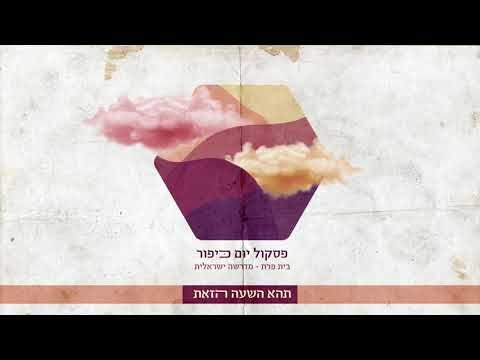T'hei hasha'ah hazot sh'at rachamim v'et ratzon mil'fanecha.
תְּהֵא הַשָּׁעָה הַזּאת שְׁעַת רַחֲמִים וְעֵת רָצוֹן מִלְּפָנֶיךָ
May this time be a period of Divine Compassion and a fitting time before You.
I think the first time I heard these words in song form was in Israel in 2010. Before that, I had only ever heard them chanted during the prayer Avinu Malkeinu that is most recognizable for its ending sing-songy chant that is ubiquitous during the High Holiday season. This line is part of that prayer and has a beautiful and haunting melody associated with it.
Music is surprising. Here we have a song most strongly associated with the High Holidays and suddenly I found it at the forefront of my mind as Lauren masterfully navigated the throes of labor last week. The whole time as I did my best to support her and navigate my own anxiety as our daughter made her way into the world, I kept chanting these words: tehei hash’ah hazot…may this time be one of compassion.
On and on, it rose in my mind like a mantra. I took all my worry and fear and wrapped it up in these words. You see, שְׁעַת רַחֲמִים, Divine Compassion, actually felt kind of fitting for birth. The word compassion in Hebrew shares a root with the word for womb in Hebrew: רחם-רחמים. When we beseech the God of Compassion as God is known, we are tapping into the very ontological nature of how we’re brought into the world. That initial protection we are gifted in the womb is what we ask of God in our most difficult moments.
It felt especially poignant in this birth story as we were surrounded by an all female labor support team: nurses, a doula, and a midwife. It all came to a head in the midst of a particularly challenging moment. As Lauren and her team navigated this wave, an older OB doctor sauntered in without introducing himself and mumbled some jargon about decelerating heart rates. Lauren in a trance-like state epically said:
Who are you and what are you doing here?
He continued with the mumbo jumbo and ultimately said something like:
It’s not good.
That’s when our heroic midwife stepped in and basically created a forcefield around Lauren, convinced the doctor that she was progressing, and off he popped, never to be seen or heard from again. There I was whispering to myself, to the fetus, and to God
May this be a time of Divine Compassion…
Not too long after that, our daughter came into the world. I was particularly struck when she arrived as Lauren was cocooned in a circle of three nurses, a doula, and a midwife. She was in a womb of support, birthing a child from her own womb, being protected from external forces that felt as if they bursting that protective emotional womb.
I was in awe of all the compassion in the room. As I was cheekily reminded by my father after the birth, there’s no mention of doctors of obstetrics in the Torah but the Torah does mention two midwives and they do happen to appear in this week’s Torah portion. After the new Pharoah decrees all male Hebrew babies to be killed, we read the following in Exodus 1:17:
וַתִּירֶ֤אןָ הַֽמְיַלְּדֹת֙ אֶת־הָ֣אֱלֹהִ֔ים וְלֹ֣א עָשׂ֔וּ כַּאֲשֶׁ֛ר דִּבֶּ֥ר אֲלֵיהֶ֖ן מֶ֣לֶךְ מִצְרָ֑יִם וַתְּחַיֶּ֖יןָ אֶת־הַיְלָדִֽים׃
The midwives, fearing God, did not do as the king of Egypt had told them; they let the boys live.
Shifra and Puah, two underrated heroines of our peoples’ story stand out for their compassionate resistance here. Wondering what was it exactly that happened here, the Or ha-Ḥayyim, a 17th century Moroccan commentator wrote as follows:
The Torah could also be telling us something about the general fate of royal decrees. Normally, when a powerful king issues a decree it is observed by his subjects due to fear. As people notice that not every violation is followed by severe penalties, more and more people begin to ignore irksome decrees. In this instance the Torah tells us that the decree was not even observed when it was still new. The midwives לא עשו, never carried out, כאשר דבר, as soon as he had said it.
What made the midwives unique wasn’t a normal level of human bravery. In a regular situation, people see others not following a rule and they then decide not to follow it, as the stakes have been lowered. According to the Or ha-Ḥayyim, these midwives never even had the thought to follow this edict. So driven by their compassion for the women giving birth and their babies, they ignored all the noise around them and did what their hearts demanded of them, to give life.
That feels so resonant to how our support team operated in that birthing. There was noise and palpable fear and grumbled edicts given and they stood on compassion. In that breach, their bravery helped Lauren deliver our baby.
I prayed in those words during the labor that it should be a time of Divine Compassion. In their resilience in that moment, they made it happen. Compassion and the womb have never felt so intertwined for me. We were encircled and held in that moment by their actions and in doing so, our baby came forth from her womb into a womb of compassion. The time had come just as we had hoped.
Shabbat Shalom and Happy Weekend!




A beaut!
mazel tov!!!